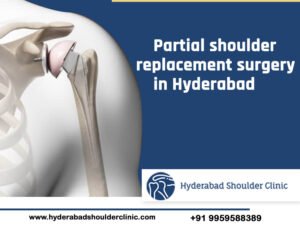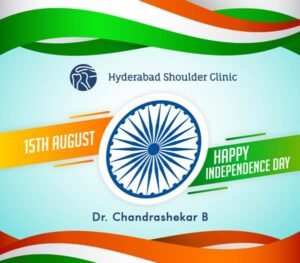Shoulder replacement surgery has become a popular choice for people seeking continuous pain relief. However, you should understand the situation as fully as possible before agreeing to such procedures. These are just some questions to remember to ask your doctor during your visit. When you talk to your doctor, remember to bring a pen and a piece of paper to make sure you record all the answers.
If you are considering a shoulder replacement, you may have many questions about the procedure, surgical preparation, recovery, and your long-term results. You should consult your shoulder surgeon based on your specific situation to understand what to expect before and after surgery. The following are some common concerns and questions of patients.
Types of shoulder replacement surgery:-
The surgery that is right for you will depend on your age, activity level, and the severity and type of shoulder arthritis.
- Total shoulder replacement surgery: Your shoulder is a spherical joint. In this method, the arthritic ball and socket are removed and replaced with a metal and plastic shoulder joint. Hyderabad shoulder clinic surgeons have extensive experience in performing this procedure, which has been used for more than 20 years.
Total shoulder arthroplasty can be performed with or without a stem that fits inside the humerus. If you have good bone density, you can usually use a stemless shoulder. A total shoulder replacement can be performed for osteoarthritis (the kind that develops due to wear and tear) or rheumatoid arthritis. You must have a functioning rotator cuff to perform this surgery.

- Partial shoulder replacement: People who have damage to only one side of the joint may be suitable for this method, which only replaces the joint ball.
- Reverse total shoulder replacement surgery: If your rotator cuff tear cannot be repaired and is accompanied by arthritis, this may be your best option. In this method, the ball socket of the shoulder joint is the reversed-a ball placed where the shoulder socket is usually located, and a ball socket is placed on top of the upper arm bone. This allows you to use muscles other than the rotator cuff to move your arm.
- Shoulder revision surgery: If your previous shoulder replacement surgery failed due to infection, incorrect placement of implants, or looseness, the doctor might advise this surgery. Our shoulder surgeons‘ experience in performing this procedure is well known. People across the country often turn to Hyderabad shoulder clinics for help to correct problems caused by reverse total shoulder replacement or rotator cuff repair failure.
What makes me a candidate for shoulder replacement surgery?
People consider shoulder replacement surgery for a variety of reasons. Here are some of the most common:
- Pain makes daily activities almost impossible, such as washing clothes, reaching for a book, putting on clothes, etc.
- Severe pain and difficulty falling asleep.
- Weak or unable to move shoulders.
- More traditional treatments such as physical therapy, cortisone injections, or anti-inflammatory drugs have failed.
What types of complications can occur?
Likewise, with any medical procedure, there is consistently the chance of complications. Make sure you clearly understand how these complications may affect you. Possible complications include infection, wound problems, excessive blood loss, nerve damage, mechanical equipment failure, fractures, weakness, stiffness, risk of anaesthesia, and other complications. Although it is good to understand the risks involved, don’t let the long list of potential complications prevent you from undergoing surgery. In addition to the possible risks, ask your doctor how common each complication is.
How to prepare for surgery?
You will first undergo a complete examination so that your doctor can make sure that you are healthy enough for shoulder replacement surgery. Next, you need to provide a complete list of the medications you are taking, as some may need to be stopped before surgery. For example, you may need to stop any medications that may cause excessive bleeding, such as aspirin, blood thinners, or arthritis medications.
You also need to plan your recovery at home. For example, find someone who can reach the shelves and cabinets to accompany you, or make sure the things you often reach are placed on low shelves or countertops. You also need help with tasks such as cooking, bathing, and dressing. If you do not have this kind of help, you may need to stay in the rehabilitation centre until you regain independence.
How will my recovery be?

After shoulder replacement surgery, you may feel pain, but you will receive a prescription for medications that help control the pain. After a few days, you may start a mild physical therapy program, increasing the intensity as your shoulders strengthen.
You may use the sling for two to four weeks after shoulder surgery to help protect the new joint. A few weeks after the operation, sutures or staples will be removed from the wound. Make sure not to let the wound get wet until your doctor says yes. It may take several months for you to recover from the operation fully. However, in the long run, you will find it worthwhile because it will greatly improve your quality of life.
Your pain will be reduced, and your range of motion and strength will be significantly greater. The time you spend recovering will vary depending on your current physical condition and other factors. Discuss with your doctor the type of process you will go through to recover fully. How much physical therapy do we need? Can your doctor provide you with a flexible time frame? This is not a one-size-fits-all answer, so be sure to learn more about what your doctor thinks of you.
How long does it take to recover from shoulder replacement surgery?
How long your recovery will take depends on several factors, including the type of surgery you have and how well you keep your physical therapy appointment and exercise. Physical therapy may begin one week after the operation. In the next 16 weeks or so, you will gradually develop from assisted exercises (your physical therapist or good arm moves the affected shoulder) to light resistance exercises and strength exercises. You may continue to gain strength for a year or two after the operation.
How long will my replacement last?
It is very important to have a realistic expectation of the lifespan of the shoulder replacement. This will help you make a viable plan for your future and let you know what to expect in the future.
Should patients need to change their diet or habits?
Depending on your current lifestyle, your doctor may suggest that you change some things in your daily life to help with recovery. This may be a good time to start making healthy choices and get rid of bad habits that may prevent recovery. Your doctor will advise you whether you need to avoid any foods or supplements before and after the operation.
Is shoulder replacement surgery an outpatient operation?
The operation is performed in an outpatient clinic, allowing the patient to go home on the same day after the operation. However, some patients stay overnight. Your surgeon will tell you his advice.
How long does the operation take?

The process may take 1 to 2 hours, depending on its complexity.
How painful is shoulder replacement surgery?
During the operation, you should not feel any pain as doctors use anaesthesia. Before the operation, the anesthesiologist will use ultrasound to inject numbing drugs around the nerves to provide local nerve block. The drug numbs the area from the neck to the arms. Your doctor may also give you a sedative to help you fall asleep during the procedure. You don’t require a general anaesthesia for this procedure in our setup.
How long will the pain last after the surgery?
Regional nerve blocks can be short-acting or long-acting and last from 18 to 72 hours. Therefore, you will not feel much pain for the first few days after the operation. Your doctor will also recommend that you start taking over-the-counter medications so that as the nerve block weakens, your pain will be minimized.
How long can patients resume normal activities after the operation?
In many cases, you can use the affected shoulder for midline daily life activities, such as eating or dressing in the first week. “Midline activities” are activities where the elbow does not exceed the midline of the body. For example, you can start driving and relaxing activities at home in 6 weeks.
Conclusion:
Before going to the doctor, please write down these questions and other questions you may have. Keep a notebook with you so you can write down any important information provided. Your doctor may also provide you with resources about surgery and recovery procedures.
Remember, you can ask as many questions as you need to be satisfied with the procedure. When facing reverse total shoulder replacement surgery, you should only receive the highest quality care. Schedule an appointment with Dr Chandra Shekar. B today. For more information about shoulder replacement surgery, please get in touch with a Hyderabad Shoulder clinic Dr ChandraShekar.B. Contact us online or call us at 91 9959588389.





